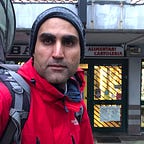Did I commit a murder? Lets play Cluedo
A good chance is that you do not know about Cluedo because either you were born too late in the last century or like me you found the game too complicated to learn and play in the days we had the time to learn and play.
In short, a certain Mr. Body is found murdered in his home/mansion and the goal is to find the room where he was murdered, which weapon was used and who did it.
Now here is the part I always found strange — as one of the players, you are a suspect yourself but you don’t know it.
(until you go through the game rounds and rigorous note taking and process of elimination)
This was contrary to real life logic where you should know something you have done in the past.
Recently I was about to hop continents and was going through the ritual of matching the credit cards, sorting out the right socket adapters and changing the sim cards. All was ‘va bene’ until I couldn't find the required sim card in any of the three possible sim card repositories: zipper in my laptop bag, bedside table drawer or inside my son’s optimus prime toy.
I had put that sim card somewhere 2 years ago and could not remember its exact coordinates. Before panic could take me over, I decided to play a little cluedo on myself. To make it all relevant, I called it the case of the ‘deadly midnight express’ (for obvious reasons) and set about asking the following questions to myself:
Did I actually find it important enough to store it safely?
Where could I safely store something so small?
Which situations would require me to quickly swap sim cards?
What is the most accessible place for me to put something like a sim card
I cannot be sure how my mind prioritized these questions or which algorithm was activated, but it all added up to one big question,
Did I follow the same framework of questions during my initial act and how trained I was to always follow the same framework?
In my case, the answer was yes to both parts: At some point of my life, I had decided to set frameworks and remember only those — the actual situations could differ but they would always obey the laws of physics I had laid down — An apple, orange or kiwi dropped from up above would fall to the ground and always become a banana — Always!
A forgotten password, an item stored somewhere so safe and secret that it is lost, a crazy idea that came to mind and vanished before writing it down. All these hazardous situations should be cast within a set of rules. Apply the rules again and you get the answer or very close to the answer.
It is risky to ensure one would remember an act or a set of acts, but asking yourself some basic questions at the time of performing that act and limiting yourself to certain parameters which are few and set in stone greatly reduces that risk. The only thing to ensure is to always take a few minutes and set those parameters carefully as per your own rule book.
So back to the deadly midnight express.
No it was not in my socks, because socks go through laundry or get mixed up or get torn, are too big for something as small as a sim card and would be weird to carry one in my pocket. As such it must have been eliminated by my framework automatically.
In fact, the framework dictated that I keep it close to me in an exact situation of arriving in another country (by air), be able to swap it sitting on a congested economy class seating and not lose the other sim card after the exchange. Given that I could be traveling with one or the other laptop bag eliminated the chances of keeping it in the bag zipper as well.
“When you have eliminated the impossible, whatever remains, however improbable, must be the truth”
Case solved.
Now, I am still looking for these $5000 I put somewhere in case of an emergency — I have decided to call this case, ‘the sign of five’.
